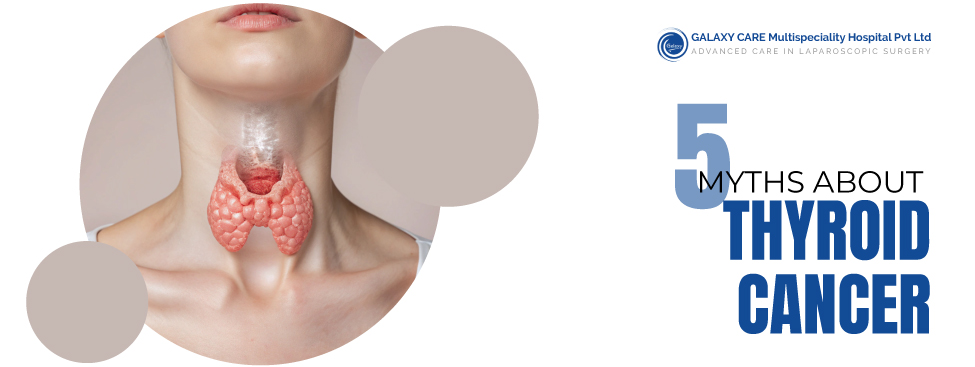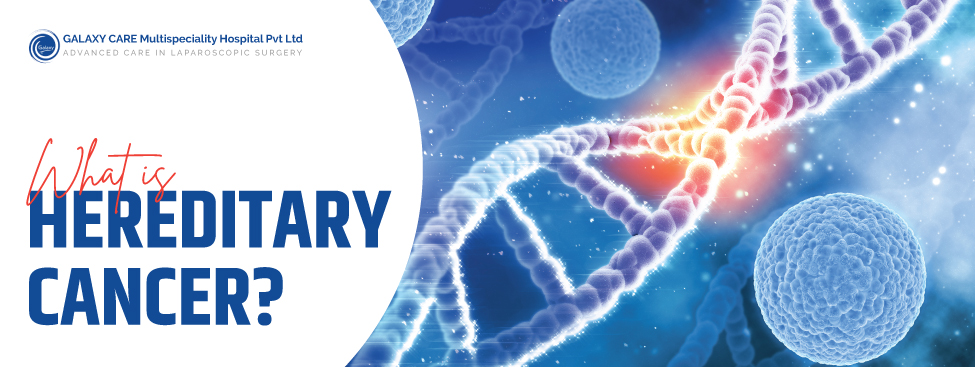
5 COMMON MYTHS ABOUT THYROID CANCER
Thyroid cancer is a form of cancer that begins in the thyroid gland, a small, butterfly-shaped endocrine gland located at the base of the neck. It is considered a relatively common type of cancer. Despite its prevalence, thyroid cancer is also surrounded by a considerable amount of myths and misconceptions. It is essential to separate facts from myths when it comes to thyroid cancer, as having a clear understanding of the disease can help ensure that individuals receive the best possible care and treatment.
At Galaxy Care Hospital, the Best Cancer Hospital in Pune for Thyroid Cancer, we believe that myths and misconceptions about thyroid cancer can sometimes lead to delayed diagnoses, inappropriate treatment approaches, or even a false sense of security about the severity of the condition. Let us address 5 common myths about thyroid cancer and provide the facts you need to know. Let’s begin.
Debunking 5 Common Thyroid Cancer Myths
Myth 1: Thyroid Cancer is Always Slow-Growing
One of the most common myths about thyroid cancer is that it is always a slow-growing, indolent form of cancer. While this may be true for some types of thyroid cancer, such as papillary thyroid cancer, it is not the case for all forms of the disease.
In reality, the growth rate of thyroid cancer can vary significantly depending on the specific type and stage of the disease. Some forms of thyroid cancer, such as anaplastic thyroid cancer, can be highly aggressive and grow rapidly. It’s important to understand that the prognosis and treatment approach for thyroid cancer depends on the individual case, not on a one-size-fits-all assumption about the speed of the disease.
Myth 2: Thyroid Cancer is Always Easy to Treat
Another common myth is that thyroid cancer is always easy to treat. While it is true that many cases of thyroid cancer can be effectively treated, especially when caught early, the reality is that the treatment process can be complex and challenging in some cases.
Factors such as the type of thyroid cancer, the stage of the disease, and the individual’s response to treatment can all play a role in the difficulty of treatment. Some patients may require a combination of treatments, including surgery, radiation therapy, and/or targeted drug therapies. In more advanced cases, the cancer may be more difficult to manage and may require a more intensive treatment approach.
Patients need to work closely with their healthcare team to understand the specific challenges and treatment options for their case, rather than assuming that thyroid cancer is always an easy-to-treat condition.
Myth 3: Thyroid Cancer is Not Hereditary
Many people believe that thyroid cancer is not hereditary, but this is not entirely accurate. While the majority of thyroid cancer cases are sporadic, meaning they occur without a known genetic cause, there is a small but significant percentage of cases that are inherited.
Certain genetic syndromes, such as familial medullary thyroid cancer (FMTC) and multiple endocrine neoplasia (MEN) types 2A and 2B, can increase an individual’s risk of developing thyroid cancer. Additionally, having a first-degree relative (parent, sibling, or child) with thyroid cancer can also increase the risk for other family members.
Individuals with a family history of thyroid cancer need to discuss their risk with their healthcare provider and consider genetic testing or more frequent screening as appropriate.
Myth 4: Thyroid Cancer is Not Life-Threatening
Another common myth about thyroid cancer is that it is not a life-threatening condition. While it is true that many types of thyroid cancer have a relatively good prognosis, especially when caught and treated early, this is not the case for all forms of the disease.
Certain types of thyroid cancer, such as anaplastic thyroid cancer, can be highly aggressive and life-threatening if not treated promptly and effectively. Even for less aggressive forms of thyroid cancer, the disease can still pose significant health risks if left unmanaged or if it spreads to other parts of the body.
Myth 5: Thyroid Cancer Only Affects Older Adults
Finally, another myth about thyroid cancer is that it only affects older adults. While it is true that the incidence of thyroid cancer increases with age, the disease can occur at any age, including in children and young adults.
In fact, thyroid cancer is one of the most common cancers diagnosed in individuals under the age of 45. Certain genetic conditions and environmental factors, such as exposure to radiation, can increase the risk of thyroid cancer in younger individuals.
It’s important for oncologists to be aware of the potential for thyroid cancer in patients of all ages and to maintain a high index of suspicion when evaluating thyroid-related symptoms or abnormalities.
Trust the Best Cancer Hospital in Pune for Thyroid Cancer Treatment
Navigating the myths and facts surrounding thyroid cancer can be challenging, but it’s essential for ensuring that you or your loved one receives the best possible care. At Galaxy Care Hospital, the best cancer hospital in Pune for thyroid cancer, our team of experienced oncologists is dedicated to providing comprehensive, evidence-based treatment for thyroid cancer patients.
As one of the best cancer hospitals in Pune, Galaxy Care Hospital offers a wide range of advanced treatment options, including laparoscopic and robotic surgery, for thyroid cancer. Our multidisciplinary approach ensures that each patient receives a personalised treatment plan tailored to their needs and circumstances.
If you or a loved one has been diagnosed with thyroid cancer, don’t hesitate to reach out to the experts at Galaxy Care Hospital. Our team is committed to providing the highest level of care and support, from accurate diagnosis to effective treatment and ongoing follow-up. With our expertise and state-of-the-art facilities, we are confident in our ability to help you or your loved one overcome the challenges of thyroid cancer and achieve the best possible outcome. Feel free to get in touch and consult our oncologist for more concerns about thyroid cancer. We are here to help!


